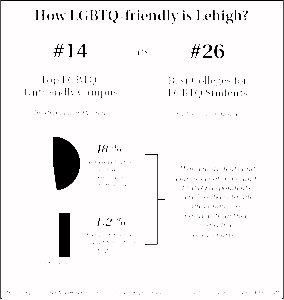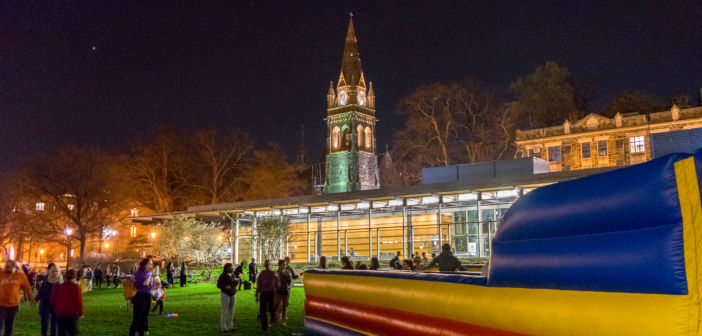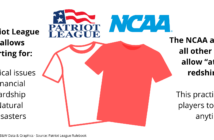Editor’s Note: An earlier version of this piece incorrectly identified Scott Burden as the assistant director of the Pride Center. His correct title is associate director of the Pride Center. A paraphrased quote from Chelsea Fullerton was also changed to accurately reflect the funding of the Pride Center.
—
This year, Lehigh University was ranked No. 14 on Princeton Review’s Top LGBTQ-Unfriendly Campuses.
Lehigh has consistently been on this list for the past few years. Last year, it was ranked No. 9. However, Lehigh was also ranked No. 26 on College Choice’s 50 Best Colleges for LGBTQ Students and praised for its high investment in LGBTQ resources.
 The placement of Lehigh on both lists could suggest a discrepancy between campus climate and investment in LGBTQ resources.
The placement of Lehigh on both lists could suggest a discrepancy between campus climate and investment in LGBTQ resources.
Chelsea Fullerton, the director of the Pride Center, said although there is an abundance of resources available for LGBTQ resources, it does not necessarily translate into a perfectly inclusive campus culture. Based on her conversations with students at the Pride Center, the resources have been very helpful for LGBTQ students, but discrimination and harassment still exist at Lehigh.
Emma Strong, ’18, works at the Pride Center and is the president of Spectrum. She said she’s grateful to have the Pride Center because it’s helped her figure out what she wants to do after graduation.
“It’s helped me feel comfortable in my own identity as bisexual,” Strong said. “I personally haven’t experienced blatant homophobia towards myself. However, it is apparent on campus that it’s not as LGBT-friendly as other schools.”
While Fullerton agrees a discrepancy exists, she also said the Princeton Review’s method of ranking is unreliable.
The Princeton Review only sends a survey to a small sample of students at each school, and the pride ranking is based on one question from the survey.
“It’s unfortunate because people take those rankings very seriously when deciding what campus they want to go to,” Fullerton said. “Unfortunately, I think they provide a really limited, if not entirely useless, perspective on what life is actually like on campus.”
Scott Burden, the associate director of the Pride Center, said it is confusing that Lehigh has been placed on a list with schools that put no investment toward fostering inclusive environments for LGBTQ students.
“At the school before us on the list, if you are caught in a relationship with someone in the same gender as you, you can be disciplined through their conduct process,” Burden said. “In fact, you can be kicked out for being gay at many of the universities that appear alongside us on that list.”
Both Burden and Fullerton said a more accurate indicator of the Lehigh student experience can be found through the annual campus climate survey.
For the past two years, the results of the campus climate survey have revealed that LGBTQ students have more negative experiences at Lehigh than heterosexual or cisgender students.
Burden said it is his understanding that though hostility is not extremely apparent on campus, there are still instances where LGBTQ students feel uncomfortable. There are situations where LGBTQ students may not feel entirely safe when walking on campus with their partners and where non-LGBTQ students unknowingly use offensive language.
“I don’t think it’s that apparent how hostile it is necessarily, but (there is) an overall lack of awareness of issues,” said Laura DeFelice, ’19, a member of Spectrum and staff member at the Pride Center. “People take things lightly because it doesn’t affect them personally. The lack of awareness and education on certain things contributes to the climate being not as friendly as we’d hope.”
Strong said she’s noticed heteronormativity on campus, which is the assumption that everyone is straight. She said this leads to people using phrases like “that’s so gay” and other offensive slurs.
“The most apparent thing I’ve experienced is when somebody finds out I’m bisexual, especially straight men, and they say, ‘Oh, that’s hot,’” Strong said.
Fullerton said changing this culture is difficult, partly because of Lehigh’s history.
“Lehigh has a culture that still has a lot of leftovers from its past,” Fullerton said. “It was a male-dominated, white-dominated, upper-class dominated place for so long and even though that’s changing, there are still elements of the leftovers that take a lot of time to change.”
To help change campus culture, Fullerton said the process is twofold: it requires both bottom-up and top-down change.
The bottom-up change refers to student attitudes and interactions.
“First, it’s allyship – having the ability to recognize difference and to celebrate it and use inclusive language,” Burden said. “You and I being able to talk about ‘different’ in a way that is not demeaning or in a way that’s not harmful.”
To improve the student experience and campus climate, the Pride Center offers LUally training sessions to educate and inform non-LGBTQ students on inclusivity. They have also implemented a new mentoring program for first-year students called IRIS, or Igniting Relationships that Inspire Social change.
First-year students who enroll in the program meet with a group that consists of a faculty or staff member, an upperclassman student and a graduate student. The group meetings are designed to foster relationships between community members of different ages and identities.
The top-down aspect refers to policy change and relationship-building with faculty and staff.
According to the 2016 campus climate survey, 10.2 percent of students who responded “yes” to having experienced offensive, hostile or intimidating conduct that has interfered with their ability to work or learn at Lehigh said they experienced such behavior from a faculty member, and 4.1 percent said they experienced it from a staff member.
Strong said some trans or non-gender conforming students may not feel safe being out to their professors.
“They try to be as under the radar as possible with their identity, and it would be really nice to have Lehigh be a place where people can be their most authentic selves,” Strong said.
Efforts have been made by the Pride Center to make the classroom a safe space for LGBTQ students. The Pride Faculty Council is a group consisting of four liaisons — hailing from all four of Lehigh’s colleges — who encourage inclusivity in the classroom. Faculty members have also attended LUally training sessions.
In the past year, several policy changes have led to partnerships with the Offices of Resident Life and Residential Services. These partnerships have led to LGBTQ-inclusive housing and the implementation of gender inclusive restrooms in many buildings across campus.
The difficulty in changing policy does not come from administrators but from complex implementation processes. Fullerton said, in her experience, staff and administrators have been open to having conversations about changing procedures.
“A lot of difficulty comes from implementation,” Fullerton said, “because if we want to add coverage to the health insurance plan, that means prices are going to go up. We want to make the record system that collects student names and genders more inclusive, but it takes a lot on the backend technically to rework that system.”
The survey also revealed that minorities have more negative experiences than white students, and female students have more negative experiences than male students. The Pride Center is working with the Center for Gender Equity and the Office of Multicultural Affairs in an effort to combat these issues.
The three offices were previously considered entities of Student Affairs but were moved to the Office of Equity and Community on May 1. The office is led by Donald Outing, the vice president for equity and community.
Under Outing’s strategic plan, the goal for all the offices is to bring a more diverse student body to campus, create opportunities for mentorship and community-building with marginalized students and expand the scope of diversity and inclusion to faculty and staff. These goals are already aligned with the Pride Center’s mission to improve the Lehigh experience for all students.
Burden said despite Lehigh being ranked as an LGBTQ-unfriendly school, the Pride Center is not discouraged and will continue its efforts to help LGBTQ students feel safe and thrive on campus.
“The biggest thing that I want students to know is that we are here for all students, faculty and staff,” Burden said. “That doesn’t mean you have to be LGBTQIA to come into my office or the Pride Center. We want people to know we are a resource for everyone.”






Comment policy
Comments posted to The Brown and White website are reviewed by a moderator before being approved. Incendiary speech or harassing language, including comments targeted at individuals, may be deemed unacceptable and not published. Spam and other soliciting will also be declined.
The Brown and White also reserves the right to not publish entirely anonymous comments.